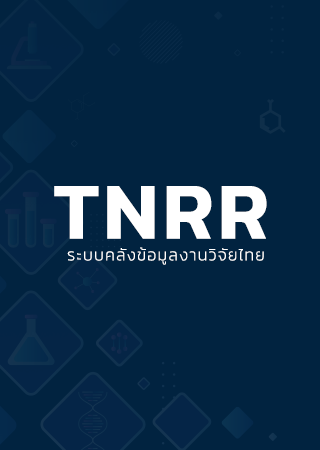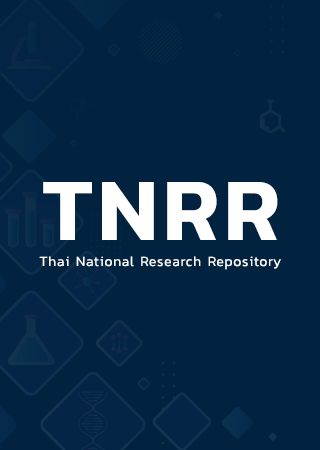Description
บทสรุปผู้บริหาร การวิจัยเรื่อง การเสริมสร้างครอบครัวเข้มแข็งตามหลักเศรษฐกิจพอเพียงในชุมชน การวิจัยมีวัตถุประสงค์ดังนี้ คือ 1) เพื่อศึกษาหลักเศรษฐกิจพอเพียงในการเสริมสร้างความเข้มแข็งของครอบครัวในชุมชน 2) เพื่อศึกษาการเสริมสร้างครอบครัวเข้มแข็งด้านการพึ่งพาตนเองในชุมชน และ 3) เพื่อหาแนวทางตามหลักเศรษฐกิจพอเพียงสำหรับการเสริมสร้างครอบครัวเข้มแข็งด้านการพึ่งพาตนเองในชุมชน การวิจัยใช้แบบผสานวิธีระหว่างการวิจัยเชิงปริมาณและการวิจัยเชิงคุณภาพ การวิจัยเชิงปริมาณโดยการเก็บข้อมูลจากแบบสอบถาม กลุ่มประชาชน ในพื้นที่คัดเลือก ของเขตความรับผิดชอบของสำนักงานส่งเสริมและสนับสนุนวิชาการ 8 จำนวน 8 จังหวัด ได้แก่ จังหวัดลพบุรี, จังหวัดอ่างทอง, จังหวัดสิงห์บุรี, จังหวัดชัยนาท, จังหวัดอุทัย, จังหวัดนครสวรรค์, จังหวัดกำแพงเพชร และจังหวัดพิจิตร จำนวน 400 ตัวอย่าง วิเคราะห์ด้วยข้อมูลเชิงปริมาณด้วยสถิติ ร้อยละ ค่าเฉลี่ย Anova t-test และ Canonical Correlation ตามตัวแบบสมมติฐานการวิจัย เพื่อพิสูจน์ความสัมพันธ์หลักเศรษฐกิจพอเพียง(พอประมาณ ความมีเหตุผล มีภูมิคุ้มกัน) ในด้าน ความรู้ และคุณธรรม มีความสัมพันธ์กับ การเสริมสร้างครอบครัวเข้มแข็งในการพึ่งพาตนเอง อย่างไร จากนั้นนำผลที่ได้ ไปสัมภาษณ์แบบเจาะลึกรายบุคคลกับผู้ให้ข้อมูลสำคัญ จำนวน 11 คน และการประชุมกลุ่มย่อย (Focus Group) จำนวน 9 คน เครื่องมือที่ใช้ในการวิจัยครั้งนี้ การเก็บรวบรวมข้อมูลเชิงปริมาณผู้วิจัยได้ใช้แบบสอบถาม เพื่อศึกษาระดับความคิดเห็นเกี่ยวกับความรู้และคุณธรรม หลักเศรษฐกิจพอเพียง (ความพอประมาณ ความมีเหตุผล มีภูมิคุ้มกัน) ในการเสริมสร้างครอบครัวเข้มแข็ง และศึกษาความคิดเห็นเกี่ยวกับการเสริมสร้างครอบครัวเข้มแข็งในการพึ่งพาตนเอง ในด้าน สังคม เศรษฐกิจ เทคโนโลยีสัมพันธภาพ และสิ่งแวดล้อม ซึ่งกำหนดระดับไว้ 5 ระดับ (rating scale) โดยผู้วิจัยลงพื้นที่เก็บข้อมูล จำนวนรวมทั้งสิ้น 400 ฉบับ ได้รับแบบสอบถามคืนมา จำนวน 400 ฉบับ คิดเป็นร้อยละ 100 การเก็บข้อมูลเชิงคุณภาพนั้นใช้แบบสัมภาษณ์กึ่งโครงสร้าง โดยการสัมภาษณ์เชิงลึก(In-depth Interview) เป็นรายบุคคลและการประชุมกลุ่มย่อย (Focus Group) ผู้ให้ข้อมูลสำคัญประกอบด้วย นักวิชาการ ปราชญ์ชาวบ้าน ผู้ที่ขับเคลื่อนงานด้านครอบครัว ผู้ที่ขับเคลื่อนงานตามหลักเศรษฐกิจพอเพียง ครอบครัวที่น้อมนำหลักเศรษฐกิจพอเพียงมาปรับประยุกต์ใช้ในครัวเรือน และผู้ที่เกี่ยวข้องในเขตพื้นที่รับผิดชอบของสำนักงานส่งเสริมและสนับสนุนวิชาการ 8 (สสว.8) ผลการวิจัย พบว่า 1) หลักเศรษฐกิจพอเพียงในการเสริมสร้างความเข้มแข็งของครอบครัวในชุมชน การนำความรู้หลักเศรษฐกิจพอเพียงใช้ในการสร้างครอบครัวเข้มแข็งในภาพรวมมีความคิดเห็น อยู่ในระดับมาก เมื่อพิจารณารายข้อ ความคิดเห็นอยู่ในระดับมาก ได้แก่ การนำความรู้เศรษฐกิจพอเพียงไปใช้ในการสร้างครอบครัวเข้มแข็ง ด้านสังคม ด้านเศรษฐกิจ ด้านสัมพันธภาพ และด้านธรรมชาติและสิ่งแวดล้อม ในขณะที่ด้านเทคโนโลยี อยู่ในระดับปานกลาง การนำคุณธรรมเศรษฐกิจพอเพียงมรรค 8 ไปใช้ในการสร้างครอบครัวเข้มแข็งในภาพรวมมีความคิดเห็น อยู่ในระดับมาก เมื่อพิจารณารายข้อ ความคิดเห็นอยู่ในระดับมากในทุก ๆ ข้อ ได้แก่ การนำคุณธรรมเศรษฐกิจพอเพียงไปใช้ในการสร้างครอบครัวเข้มแข็ง ด้านสังคม ด้านเศรษฐกิจ ด้านเทคโนโลยี ด้านสัมพันธภาพ และด้านธรรมชาติและสิ่งแวดล้อม 2) เพื่อศึกษาการเสริมสร้างครอบครัวเข้มแข็งด้านการพึ่งพาตนเองในชุมชน ในภาพรวมความคิดเห็น อยู่ในระดับมาก เมื่อพิจารณารายข้อ ความคิดเห็นอยู่ในระดับมากในทุกข้อ ได้แก่ ความสามารถเรียนรู้ปรับตัวดำเนินชีวิตในสังคม มีวิถีชีวิตเป็นตัวอย่างที่ดีแก่บุคคลในชุมชน มีส่วนร่วมอนุรักษ์ศิลปวัฒนธรรมประเพณี เสียสละเกื้อกูลในการจัดกิจกรรมชุมชนและ สร้างความไว้เนื้อเชื่อใจต่อคนในชุมชน ความแตกต่างของระดับการนำไปปฏิบัติ การนำความรู้และการนำคุณธรรมหลักเศรษฐกิจพอเพียงใช้ในการสร้างครอบครัวเข้มแข็ง จำแนกตามรายได้เฉลี่ยต่อเดือน กลุ่มรายได้ที่แตกต่างกันมีความคิดเห็นการนำความรู้และการนำคุณธรรมหลักเศรษฐกิจพอเพียงไปใช้ในการสร้างครอบครัวเข้มแข็ง แตกต่างกัน และ 3) เพื่อหาแนวทางตามหลักเศรษฐกิจพอเพียงสำหรับการเสริมสร้างครอบครัวเข้มแข็งด้านการพึ่งพาตนเองในชุมชน พบว่า ข้อมูลส่วนบุคคลของผู้ตอบแบบสอบถาม เพศ อายุ มีระดับการปฏิบัติ การนำความรู้และการนำคุณธรรมหลักเศรษฐกิจพอเพียงใช้ในการสร้างครอบครัวเข้มแข็ง ไม่แตกต่างกัน และ การนำไปปฏิบัติเพื่อการเสริมสร้างครอบครัวเข็มแข็งในการพึ่งพาตนเอง ไม่แตกต่างกัน ในส่วนของสถานภาพ การศึกษา อาชีพ รายได้ มีระดับการปฏิบัติ การนำความรู้และการนำคุณธรรมหลักเศรษฐกิจพอเพียงใช้ในการสร้างครอบครัวเข้มแข็ง แตกต่างกัน และ การนำไปปฏิบัติเพื่อการเสริมสร้างครอบครัวเข็มแข็งในการพึ่งพาตนเอง แตกต่างกัน หลักเศรษฐกิจพอเพียงในด้านความรู้ (พอประมาณ ความมีเหตุผล มีภูมิคุ้มกัน) และคุณธรรมตามมรรค 8 (ความเห็นที่ถูกต้อง ความคิดที่ถูกต้อง เจรจาที่ถูกต้อง การปฏิบัติที่ถูกต้อง การหาเลี้ยงชีพที่ถูกต้อง ความเพียรที่ถูกต้อง การมีสติที่ถูกต้อง การมีสมาธิที่ถูกต้อง ) มีความสัมพันธ์กับการเสริมสร้างครอบครัวเข้มแข็งในการพึ่งพาตนเอง ในด้านสังคม ด้านเศรษฐกิจ ด้านเทคโนโลยี ด้านสัมพันธภาพ และด้านธรรมชาติ/สิ่งแวดล้อมมีความสัมพันธ์กันในเชิงบวก ร้อยละ 79.7 เป็นความสัมพันธ์ในระดับสูง สรุป การเสริมสร้างครอบครัวเข้มแข็งตามหลักเศรษฐกิจพอเพียงในชุมชน พบแนวทางในการเสริมสร้างครอบครัวเข้มแข็งตามหลักเศรษฐกิจพอเพียงในการพึ่งตนเองในชุมชน 6 แนวทาง เริ่มจาก 1) การแสวงหาความรู้ 2) การปรับเปลี่ยนวิธีคิดตามหลักธรรม 3) การวางแผนดำเนินชีวิตด้วยการมีส่วนร่วมของครอบครัว 4) การลงมือปฏิบัติโดยอยู่ในงบประมาณ 5) การประยุกต์ใช้ในชีวิตประจำวัน และ 6) การเผยแพร่ด้วยการแลกเปลี่ยน และการถ่ายทอดความรู้ ซึ่งนำไปสู่ความเข้มแข็งของสถาบันครอบครัวในการพึ่งตนเอง ข้อเสนอแนะเชิงนโยบาย1. กระทรวงการพัฒนาสังคมและความมั่นคงของมนุษย์ ควรส่งเสริมความรู้ความเข้าใจ สร้างกระบวนการ และพัฒนากระบวนการสื่อสารทางสังคมในการเสริมสร้างความเข้มแข็งของครอบครัวตามหลักเศรษฐกิจพอเพียงการพึ่งพาตนเองให้กับหน่วยงานในกระทรวง และกลไกที่ขับเคลื่อนนโยบาย/ยุทธศาสตร์การพัฒนาสถาบันครอบครัว 2. กระทรวงการพัฒนาสังคมและความมั่นคงของมนุษย์ ควรพิจารณาการขับเคลื่อน นโยบายยุทธศาสตร์การพัฒนาสถาบันครอบครัว พ.ศ. 2558 – 2564 ไปสู่การปฏิบัติที่เป็นรูปธรรม 3. กระทรวงการพัฒนาสังคมและความมั่นคงของมนุษย์ ควรมีการติดตาม ประเมินผลการขับเคลื่อนให้เป็นไปตามแผนนโยบายยุทธศาสตร์การพัฒนาสถาบันครอบครัว พ.ศ. 2558 – 2564 ข้อเสนอแนะเชิงปฏิบัติการ ข้อเสนอแนะเชิงปฏิบัติการ การให้กรมกิจการสตรีและสถาบันครอบครัว (สค.) และหน่วยงานที่เกี่ยวข้องดำเนินการ ดังนี้1. ส่งเสริมให้ครอบครัวดำเนินชีวิตตามแนวทางปรัชญาเศรษฐกิจพอเพียง เพื่อให้สามารถ พึ่งพาตนเองและมีภูมิคุ้มกันภายใต้สภาวการณ์ที่เปลี่ยนแปลง 2. กำหนดให้บรรจุองค์ความรู้ด้านการพึ่งพาตนเองตามหลักเศรษฐกิจพอเพียงในโรงเรียนครอบครัว 3. ส่งเสริมให้สมาชิกในครอบครัวอยู่ร่วมกันในบ้านหลังเดียวกัน เพื่อเสริมสร้างความเข้มแข็งครอบครัวไทยในชุมชนโดยใช้ทรัพยากรที่มีในชุมชน 4. ให้ศูนย์พัฒนาครอบครัวในชุมชน (ศพค.) หรือโรงเรียนครอบครัวพอเพียงเพื่อแลกเปลี่ยนเรียนรู้ และส่งเสริมความรู้ความเข้าใจในด้านความรู้ คุณธรรม และแนวทางการอยู่ร่วมกันในการเสริมสร้างความเข้มแข็งของครอบครัวตามหลักเศรษฐกิจพอเพียงข้อเสนอแนะในการวิจัยครั้งต่อไป1. ควรศึกษาการเสริมสร้างครอบครัวเข้มแข็งในการพึ่งพาตนเองด้านสัมพันธภาพในครัวเรือนของครอบครัวต้นแบบ 2. ควรวิจัยเชิงทดลองการเสริมสร้างครอบครัวตามหลักเศรษฐกิจพอเพียงในการพึ่งพาตนเองด้านเศรษฐกิจของครอบครัวยากจน เพื่อพัฒนาแนวทางในการเสริมสร้างครอบครัวเข้มแข็งในชุมชน 3. ควรวิจัยแนวทางพลังประชารัฐในการเสริมสร้างครอบครัวเข้มเข็งพึ่งพาตนเองด้านสังคม เพื่อให้บทบาทของครอบครัวและภาคีต่าง ๆ มีส่วนร่วมในการสร้างสังคมเกื้อกูลในชุมขน<br><br>Executive Summary A study of the building a resilience in families with the community-based sufficiency economy practices was primarily aimed 1) to examine the sufficiency economy practices in strengthening families in the communities, 2) to examine building a resilience in families on community-based self-reliance, 3) to identify sufficiency economy approach for strengthening family on community-based self-reliance. In this study, it is a mixed method of the quantitative and qualitative research. Quantitative method involves data collection using the questionnaires; the sample includes a total of 400 participants from eight selected provinces; including Lopburi, Ang Thong, Singburi, Chainart, Uthai Thani, Nakhon Sawan, Kamphaengphet, and Pichit. In the quantitative method, data analysis was conducted using ANOVA, t-test and Canonical Correlation, based on the research hypothesis to investigate how sufficiency economy practices (modesty, rationality, immunity) on knowledge and ethics have been correlated with the strengthening of families on self-reliance. The results are adapted to interview eleven key informants and focus group of nine members. The instrument used in this research include quantitative data collection by using the questionnaires, aiming to investigate the level of opinions about knowledge and ethics with respect to the sufficiency economy practices (modesty, rationality, immunity) in strengthening the family, and to examine the opinions about strengthening families in self-reliance on social, economic, technological, relationship, and environmental dimension, defined in 5-point rating scale. The total number of 400 completely-filled out questionnaires was returned, representing 100%. In the qualitative data collection, the semi-structured interview was adopted. The in-depth interview made with key informants individually and focus group was administrated. Key informants consist of educators, learned villagers, and the propellers engaging in family affairs, the propellers engaging in economic sufficiency practices, the families adopting the sufficiency economy practices, and those relevant stakeholders subject to the Technical Promotion and Support Office 8 (TPSO 8)The results found as follows: 1) overall, sufficiency economy in building resilience in families in the community, the adoption of the sufficiency economy practices to strengthen families was of high level of the opinion, in each respect of areas, it found that the high level of the opinion with respect to the adoption of the sufficiency economy practices to strengthen families on social, economic, relationship, natural, and environmental dimension whereas it found the moderate level of the opinion with respect to the adoption of the sufficiency economy practices to strengthen families on technology. The adoption of the Noble Eightfold Path sufficiency economy practices to strengthen families was of high level of the opinion, in each respect of areas, it found that the high level of the opinion with respect to the adoption of the sufficiency economy practices to strengthen families on social, economic, technological, relationship, natural, and environmental dimension 2) Strengthening family on community-based self-reliance was of high level of the opinion, and in each respect of areas, it found the high level of the opinion with respect to strengthening family on community-based self-reliance in all aspects, namely, the ability to learn and to adapt the life in society, living in a good example for people in the community, participation in art, cultural and traditional conservation, sacrifice and supporting the community activities, and building trust with community people, the varying level of implementation, the application of knowledge and ethics of sufficiency economy practices to build a strong family. As factored by average monthly income, people with different range of monthly income reported the different opinion toward the adoption of sufficiency economy practice to build resilience in family. 3) Identifying the sufficiency economy approach to strengthen families on self-sufficiency, no difference was found as factored by gender and age on the level of the implementation, the application of knowledge and ethics of the sufficiency economy practices to strengthen families. No difference was found as factored by marital status, educational level, occupation, income on self-reliance whereas the difference was found on application of knowledge and ethics of sufficiency economy practices to build a strong family, and the adoption of the sufficiency economy practices to strengthen families on self-reliance. The sufficiency economy practices (modesty, rationality, immunity) and Noble Eightfold Path(Right Understanding, Right Thought, Right Speech, Right Action, Right Livelihood, Right Effort, Right Mindfulness , Right Concentration) sufficiency economy practices to strengthen families were strongly correlated with strengthening families in self-reliance on social, economic, technological, relationship, natural, and environmental dimension by 79.7 percent. Conclusion: Strengthening the family with community-based sufficiency economy practices indicated six approaches to strengthen a self-reliant family based on sufficiency economy in the community as follows; 1) seeking knowledge, 2) adapt the way of thinking based on Dharma principles, 3) life planning with family involvement, 4) action under reasonable budget, 5) practical application in daily life, and 6) publishing by exchange and transfer of knowledge , thereby leading to the self-reliant family based on sufficiency economy.Administrative Recommendation 1.Ministry of Social Development and Human Security should promote knowledge and understanding; create a social communication development process to strengthen families based on sufficiency economy and self-reliance to the Ministry units and the mechanisms that drive family institute development policies / strategies.2. Ministry of Social Development and Human Security should take into account the family institute development policies / strategies B.E.2015-20211 to the more concrete practicality 3.Ministry of Social Development and Human Security should pursue the follow-up of evaluation results in accordance with the strategic plan for family development institute B.E.2015-20211. Suggestions for action The suggestions for action should engage the Department of Womens Affairs and Family Development (DWF) and related agencies to pursue the following: 1.Encourage families to live in accordance with the Philosophy of Sufficiency Economy and self-reliance with healthy immunity under changing circumstances. 2.Designate the self-reliance knowledge in accordance with sufficiency economy in the Family Schools. 3.Promote family members to stay together in the same house to promote a resilience of the Thai families in the community through the available resources in the community. 4.Designate the Community-based Family Development Centers (CFC) or Sufficiency Family Schools to promote the exchange of knowledge and to promote knowledge and understanding of morality and coexistence in healthy family based on sufficiency economy.Suggestions for future research1. Building a resilience of family on self-reliance and family relationship of the prototype family should be investigated. 2.The experimental research of building a resilience of family in accordance with sufficiency economy on economic self-reliance in the poor families should be carried out as guidelines for strengthening families in the community. 3.The power of the civil society to promote strengthening family on social self-reliance should be investigated such that the role of families and partners involvement contribute to the development of community and society.
Date of Publication :
03/2023
Publisher :
สำนักงานปลัดกระทรวงการพัฒนาสังคมและความมั่นคงของมนุษย์
Category :
รายงานการวิจัย
Total page :
77012 pages
People Who Read This Also Read


